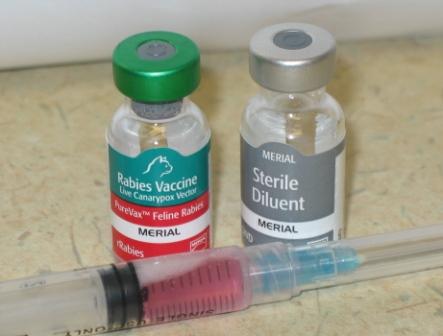
Due to a problem in the manufacturing plant, our preferred feline rabies vaccine (PureVax) has gone on a temporary backorder. The problem has been resolved, but the plant must go through a re-approval process before more vaccine can be made. Thus, our preferred vaccine is unavailable until at least the middle of June.
How does the Rabies vaccine work?
Vaccines work by stimulating the body to mount an immune response to the injection. Viral vaccines can be either “killed”, meaning they contain a dead version of the virus we are trying to prevent, or “modified live”, meaning they contain a virus that has been changed so that it can no longer cause disease. The rabies virus in all vaccines is killed. A killed virus does not cause the immune system to pay much attention, so something must be added to the vaccine to make the immune system mount an adequate response. In most brands of rabies vaccines, the immune stimulant is an adjuvant, a small amount of material foreign to the body that causes the immune system to sit up and take notice. In the PureVax rabies, the immune stimulant is a modified live version of canary pox, a bird virus that does not cause disease in cats. When the body sees the modified canary pox, the immune system develops antibodies to all parts of the vaccine, including rabies.
Why do we prefer PureVax Rabies?
The problem with most rabies vaccines is the adjuvant. In rare cases (1 in 10,000 patients), feline patients who receive an adjuvanted vaccine can develop a fibrosarcoma at the site of the vaccination. A fibrosarcoma is a locally aggressive soft tissue cancer. These tumors have thousands of microscopic tendrils that invade the surrounding tissue, making them very difficult to remove surgically. In many cases, fibrosarcoma is a terminal disease for the affected patient. The risk of developing this tumor after vaccination is low. However, the PureVax rabies vaccine was developed to lower the risk of fibrosarcoma development even further.
How should I handle the vaccine backorder?
Rabies is a very real risk in our area, and all cats need to be vaccinated. Cats that come into contact with other animals (cats, dogs, or wildlife) are especially at risk and owners should not allow their rabies vaccines to lapse. Rabies vaccination is required by law for all cats and dogs.
If your cat is due for its rabies vaccine before the PureVax rabies is available again, you have two options:
1) Vaccinate your cat with an adjuvanted rabies vaccine at the time of its exam. This is the same vaccine we use in dogs, and it imparts 3 year immunity for rabies.
2) Perform your cat’s exam on time, but wait to vaccinate until the PureVax vaccine returns (this can be done as a courtesy appointment when the vaccine is back in stock, as long as there are no new or additional concerns).
We will be happy to discuss the options with you at the time of your cat’s exam. You may also give us a call if you have questions or concerns.


Leave A Comment